Chickens Running in All Directions (XII)
Who is a heavyweight? I mean a heavyweight in a charismatic way.
I know that every star of whatever brightness is believed to be a heavyweight. However, this is a suspect presumption. The twinkle of a star may be but a twinkle.
The charisma of a heavyweight calls back to my mind the office of the Sacred King, the mythological, but not always, figure of ‘ancient’ times. This was a man, and sometimes a woman, who did real things in such a way that he-she earned themselves a place in a nation-founding myth.
Before the founding myth there was no Sacred King or Queen to guide society beyond the mother, children, and wandering Son circle. The members of this group were so much into each other that they seldom fought with each other.
Nevertheless, this incredibly tight knot, which was bound by incest [might this have been the original Gordian knot?] was often visited by exceptions: unforgettable murders. The murder by Cain of Abel belongs to this genre. The war between kings Paris of Troy and Menelaus of Sparta for the living body of Queen Helen was likely due to the fact that Helen’s bed was too close to that of her brothers. Such intimate relationships have long been erased from the founding story, whether the Bible or myth. Nevertheless, the story is a near perfect example of pareidolia http://en.wikipedia.org/wiki/Pareidolia in story telling. One may see this type of pareidolia as deliberate in order to facilitate the sometimes repressed mind. The ‘Mind’ of Western society fits the bill.
Due to the unwelcome outbreaks of murder among the ‘original’ family, a larger society—if it was to maintain itself beyond the immediate intimate circle for any length of time—needed to discover a reason for being. Why indeed not return to the warm circle of babies nuzzling the breasts of their mothers, the family where sex among its own is unavoidable?
There are two ways in which an incest ridden family can avoid future outbreaks of fratri-cide. One is 1) to leave the murderous event, the horror, and prevent a recurrence of itself as long as it remains part of a society’s living memory, but thereafter risk a repetition; or 2) repress incest.
The repression of incest fell to the office of The Sacred King.
The Sacred King did not repress (as we may think today) by using the police or a military, but by offering his life to death. By giving (voluntarily) his life to death, the king creates for ‘death’ its large D. The Death of the Sacred King creates such charisma that it equals and passes the charisma of two brothers trying to slay each other.
In other words, Why us, why is it that we must die, but not them; or why we and they, but not they over there are dying?
The cause of an enlarged social space is stimulated into being by two powerful factors: 1) the fact that sooner or later a murder not only does but must occur; and 2) that without a mediating resource, the default will prevail; in other words, catastrophes of a tragic nature will be frequent. Brothers will kill brothers as if no sisters had been born. Incestuous dreams lead to incest, and death of one of the brothers will be by the hand of the other, who found his brother’s legs entwined with the same legs that bore them both.
The story of incest may seem far from the political economy of Latvia Latvia
This is how the big D is weighed: Death on the one hand, Dick on the other. Both names are heavyweight, but the last one is for a laugh, no?
In Latvia America London Paris Berlin
The Populists are the jelly on which the Tower of Babel Tower of Babel
One sees this polarized relationship between the oligarch who pretends to the Prime Minister’s job of Latvia
What does one Lembergs do for an encore after President Berzins, who—before being stirred into a passion for his country by high office—receives the highest pension inLatvia England Latvia Latvia
What does one Lembergs do for an encore after President Berzins, who—before being stirred into a passion for his country by high office—receives the highest pension in
The Middle Class, the “successes” from among the Populists are close enough to their Populist roots to appreciate the difference, and continues to kiss the oligarchs’ Blarney Stone http://www.irelandseye.com/blarney/blarney.shtm till it shines and right can no longer be distinguished from wrong.
































